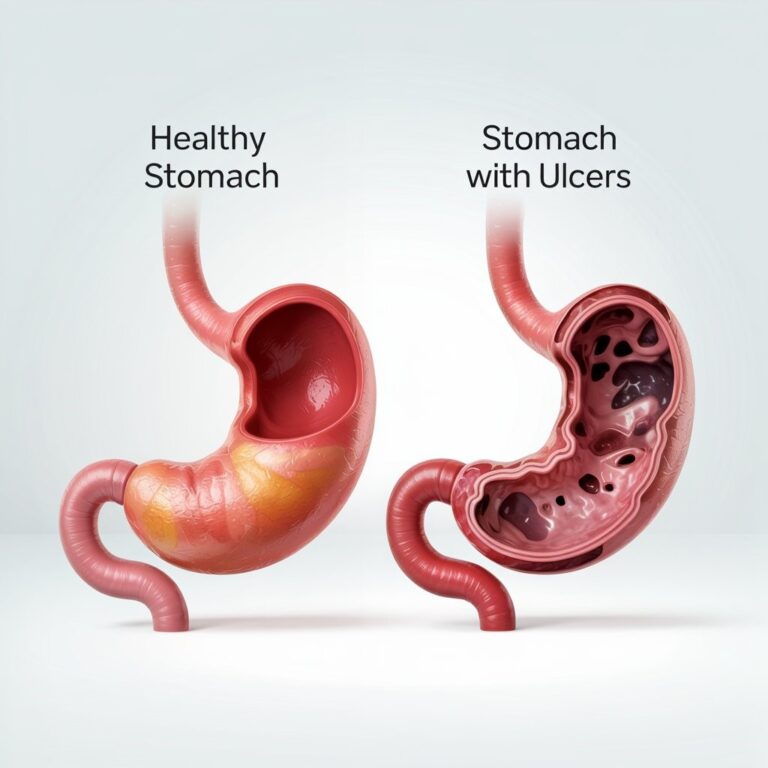Gut Feelings Are Real: How Digestion Affects Your Mood
Introduction
Have you ever experienced strong inner feelings inside your stomach? Or felt butterflies in your stomach before a big event? Your gut provides real physiological signals that affect your emotional state as well as your mental health and your total wellbeing. Research shows that scientists have revealed the gut-brain relation which represents an interesting link between stomach wellness and emotional state function. This article discusses how digestion influences mood through gut bacterial actions and presents natural ways for improving both stomach and mental well-being.
Understanding the Gut-Brain Connection
Your gut remains connected to your brain through the vagus nerve as this major information route establishes direct pathways from your digestive system to central nervous system functions. Through the gut-brain axis the two systems exchange constant information. Never underestimate your gut which holds 100 million neurons referred to as enteric nervous system or ENS and operates similarly to a second brain.
The ENS is responsible for:
- Regulating digestion and nutrient absorption
- A signaling process exists for maintaining brain understanding of hunger levels and satiety feelings.
- The gastrointestinal system creates neurotransmitters which modify both mental state and cognitive capacities.
The Role of Neurotransmitters
The gut performs a major production of serotonin which science commonly labels as the “happiness hormone.” The digestive tract produces about 90 percent of all serotonin throughout the body. This neurotransmitter is essential for:
Regulating mood and reducing anxiety
Promoting restful sleep
Enhancing cognitive function
Gut bacteria play an essential role in the regulation of dopamine which is among the crucial neurotransmitters produced by the body. The depression along with diminished motivation which originates from low dopamine levels help establish the intensive bond between gut health and mental well-being.
How Poor Digestion Leads to Mood Imbalances
If your digestion isn’t functioning properly, it can negatively impact your mood in several ways. Here’s how:
Inflammation and Mental Health
Cottage Chester when unhealthy leads to sustained inflammation documented as a risk factor for both anxiety and depression. The overpopulation of harmful bacteria in the gut leads to the production of lipopolysaccharides (LPS) which generate brain inflammation that produces mood disorders.
Chronic inflammation disturbs neurotransmitter production of serotonin and dopamine thus causing the following symptoms to emerge:
- Persistent stress and anxiety
- Difficulty concentrating (brain fog)
- Low energy and fatigue
Leaky Gut Syndrome
Gut lining breakdown creates an effect where toxins along with undigested food particles move through into the bloodstream to start an immune response. Leaky gut condition which is also known as leaky gut syndrome shows relationships with these following symptoms:
- Brain fog
- Fatigue
- Anxiety and depression
An inflamed gut lining increases blood-brain barrier permeability thus making the brain exposed to oxidative damage and resulting inflammation to disrupt mental function and mood stability.
Nutrient Deficiencies
Digestive problems result in the improper absorption of necessary nutrients that include:
B vitamins (important for brain function and energy)
Dietary omega-3 fatty acids help reduce inflammation while enhancing brain function by supporting cognitive processes.
The brain requires magnesium because it serves as a regulator of mood and stress management.
Mood swings and irritability together with mental fatigue occur when these essential nutrients are missing from the body. The brain health of vitamin B12 depends on its ability to prevent depression whereas omega-3 fatty acids both reduce neuroinflammation and maintain emotional steadiness.
Imbalance of Gut Bacteria
Your body hosts trillions of bacteria within the gut, playing a crucial role in regulating essential processes such as digestion and immune function. Research shows that dysbiosis which happens when good bacteria fail to exceed bad bacteria leads to depression together with anxiety and potentially advancements towards neurodegenerative conditions.
Gut microbiome imbalance shows its signs through the following indications:
- Increased sugar cravings
- Frequent digestive issues (bloating, constipation, diarrhea)
- Unexplained mood swings
How to Improve Gut Health for a Happier Mind
Improving your gut health can significantly boost your mood and mental clarity. Here are some scientifically-backed strategies:
Eat a Gut-Friendly Diet
Consuming nutrient-rich whole foods enhances the health of your gut microbiome.
Finding probiotics requires fermented food items such as yogurt kimchi along with sauerkraut.
Leafy greens, legumes, and whole grains provide high-fiber nourishment that supports the growth of beneficial gut bacteria.
The diet should include nuts seeds and olive oil as healthy fats that help reduce inflammation.
Fish and poultry will provide lean protein that helps turn neurotransmitters into active molecules.
Take Probiotics and Prebiotics
When taking probiotics patients receive helpful bacterial strains which colonize their digestive system. Parts and supplementation forms of prebiotics occur in foods such as kefir kombucha and miso.
Prebiotics occurring in garlic onions and bananas act as food which boosts the population of beneficial bacteria.
When gut bacteria remain balanced, they generate serotonin and dopamine, which help regulate mood more effectively.
Manage Stress Effectively
The combination of long-term stress produces gut dysfunctions that alter the natural microbial composition in the digestive system. Combat stress with:
Meditation helps manage stress by calming the nervous system, reducing cortisol levels, and promoting mindfulness. It enhances emotional resilience, improves focus, and fosters relaxation, leading to a more balanced and peaceful mind.
Deep breathing exercises manage stress by activating the parasympathetic nervous system, reducing cortisol levels, and promoting relaxation. They enhance oxygen flow, lower heart rate, and create a calming effect, improving overall emotional well-being.
Body exercises including yoga and walking alongside strength training activities help stimulate gut bacteria beneficial to health.
Adequate sleep serves as a critical factor because poor rest causes negative effects on digestion system alongside neurotransmitter production
When stress reduction takes place it simultaneously benefits digestion alongside strengthening mental cognition and personal endurance.
Avoid Gut Disruptors
The following factors cause damage to the digestive system:
Feeding harmful bacteria and triggering inflammation occurs when eating an excess of processed foods together with sugar.
The excessive use of antibiotics badly affects beneficial bacteria and reduces their strength from the gut which leads to disrupted gut balance.
The consumption of both alcohol and caffeine in excess disrupts the gut lining while affecting neurotransmitter operation.
Stay Hydrated
A sufficient water supply helps the body to identify nutrients alongside preserving gut lining health and enabling proper digestion. Drinking eight glasses of water daily constitutes the minimum requirement for hydration needs. When we remain hydrated our bodies produce the necessary enzymes for digestion and avoid develops issues with constipation that could harm gut bacteria balance.
Exercise Regularly
The practice of physical exercise boosts variety of good gut bacteria while simultaneously enhancing digestive processes according to scientific research. Better blood circulation in the intestines results from exercise because it decreases inflammation and enhances serotonin production.
Some beneficial activities include:
Walking and jogging together serve to activate gut motility.
Minimal yoga activities help users lower their stress levels and experience better digestion functions.
This exercise induces strengthening of the body to support metabolic well-being.
Intermittent Fasting
The interval of digestive system rest achieved through intermittent fasting allows your gut microbiome to reset properly. The practice of fasting enables beneficial bacteria to grow their population and simultaneously reduces inflammation to enhance gut operations as a whole.
Final Thoughts
The condition of your gut strongly influences your mental state. Caring for your digestive system will help you achieve better mental health outcomes while fighting stress and bring about general happiness. You can achieve remarkable daily wellbeing improvements through a straightforward with inclusion of diet adjustments along with stress control and hydration alongside physical exercise in you daily habitat.







